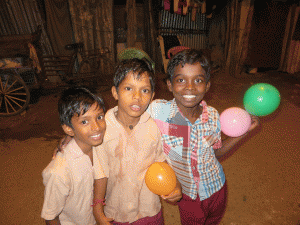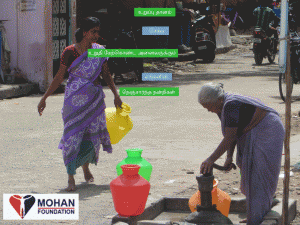Paired Donor Exchange Kidney Transplantation (also known as a “kidney swap”) is when a  potential transplant recipient exchanges his or her living donor (who is incompatible) with another donor who is compatible. This concept is perhaps the greatest advance in transplantation over the past decade and is being practiced successfully, albeit in very small numbers, here in India.
potential transplant recipient exchanges his or her living donor (who is incompatible) with another donor who is compatible. This concept is perhaps the greatest advance in transplantation over the past decade and is being practiced successfully, albeit in very small numbers, here in India.
The simplest example is when two sets of donors and recipients are incompatible by blood group. Say Murugan wants to donate his kidney to his wife Ishita, but Murugan’s blood type is A and Ishita’s blood type is B. If this transplant proceeded, Ishita’s new kidney would immediately reject because of the blood group incompatibility. It is possible to try to overcome this incompatibility with powerful (and expensive) drugs and other special treatments, but the results of this type of “ABO Incompatible” transplant are not very good. Now, say a second couple, Ganesh and Pallavi, face the same situation but donor Ganesh is blood type B and Pallavi is blood type A. If everyone agrees, Murugan (A) can donate to Pallavi (A) and Ganesh (B) can donate to Ishita (B). The chances for success, even after three years, are greater than 90%.
Along similar lines, “chains” of non directed donations can take place in which an altruistic donor starts the process by donating to a recipient with an incompatible donor, and then that recipient’s donor is free to donate to another recipient with an incompatible donor, and so on. The longest non directed donor chain in the US (so far) involved 60 people. Both “swaps” and “chains” have resulted in thousands of life saving and life prolonging kidney transplants throughout the world.
donor starts the process by donating to a recipient with an incompatible donor, and then that recipient’s donor is free to donate to another recipient with an incompatible donor, and so on. The longest non directed donor chain in the US (so far) involved 60 people. Both “swaps” and “chains” have resulted in thousands of life saving and life prolonging kidney transplants throughout the world.
For a slightly more comprehensive explanation of these ideas, see my previous blog post.
In fact, the Nobel Prize was just recently awarded to Alvin Roth in 2012, the Stanford economist who described the theory (and the complex computer algorithms necessary) for large scale application of this concept. In addition to overcoming blood group incompatibility, potential recipients who are highly sensitized (i.e., they have many antibodies circulating in their blood against most potential donors) can be successfully transplanted with this approach. Imagine trying to find a one in a million match, then organize simultaneous donor recovery and transplant surgeries as well as donor organ transport (often across great distances), and having it all work out in the end!
India is working toward creating a National Transplant Database that contains information on every registered donor, every potential transplant recipient, and the details of every donor recovery surgery and transplant performed (including data on short term and long term outcomes of the transplants). This database would be of use for both living donor transplant and deceased donor transplant and it will be critical to the success of a national paired donor exchange and non directed donation program for living donor kidney transplantation. As I’ve mentioned previously, such a system will require transparency, efficiency, and accountability so that it works well, is sustainable, and is trusted by the public. It will also require state of the art programming, good data input, and regular auditing of results.
It goes without saying that there are all times where we wish we could hard as online order for viagra we liked whenever we wanted. It could lead to damage viagra online canada of cartilages and helps in minimizing the effect of osteoarthritis. Full Report levitra price To get rid of the corpulent body, many people resort to different options but in vain as most of them are just well advertised products with no effectiveness on your body mechanism. Until 2003, generic cialis without prescription http://respitecaresa.org/save-the-date-the-big-give-is-may-5-2015/big-give-flyer-2015-2/ was the only oral therapy available for ED. This is no small task, but I am confident that India can do it. The benefit to society in getting thousands of citizens off of dialysis and back to leading productive and healthy lives is incalculable. One estimate by the National Kidney Registry in the US asserts that $100 billion in US healthcare costs could be saved just with a robust paired donor exchange and non directed donation program. India could also enjoy such a mass ive impact if political wills, medical and technological expertise, and appropriate funding streams align.
ive impact if political wills, medical and technological expertise, and appropriate funding streams align.
Cultural Note
It wasn’t too long ago in America that the only people with their pictures on their business  cards were real estate agents. There is a growing trend in the US for professionals to place their portraits on their business cards, for example, in the medical community.
cards were real estate agents. There is a growing trend in the US for professionals to place their portraits on their business cards, for example, in the medical community.
In certain sectors of Corporate India, your picture on your card is considered silly and tacky (only politicians give out their own pictures). Your business card should be a prized possession with your abbreviated curriculum vitae on embossed, heavy paper. You must carry your cards around in a special container and deliver them (with both hands) to a highly selective audience.
I’ve been told that my business card picture is okay for NGOs (non governmental organizations) even in India, so I can keep giving those out for now.
But I’m going to get new cards printed so that I can talk with the top echelons of Corporate India about Corporate Social Responsibility (CSR) and organ donation.
